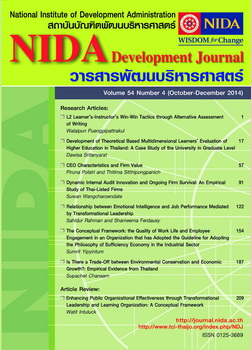CEO Characteristics and Firm Value
Main Article Content
Abstract
This study examines the effects of CEO characteristics on firm value. The samples are non-financial firms listed on the Stock Exchange of Thailand during the period 2001-2005. We move beyond the classic agency theory by classifying CEO characteristics into three groups: biography, networks, and incentives. Our CEO characteristics were developed based on the upper-echelon, resource dependence, and agency theories. The results suggest that the these theories could be used to explain the impact of CEO characteristics on firm value. According to the upper-echelon perspective, CEOs, who are experienced in the business field, are knowledgeable and competent in terms of making good strategic decisions, hence increasing firm value. Based on the resource dependence theory, CEOs with the longest-established university’s alumni network are more preferable to Thai firms because they can obtain better access to external resources and useful information than those without such a network. However, the agency theory suggests that old CEOs may lack incentives to serve shareholders’ interests because they are entrenched and are not concerned about their future career. Consequently, these CEOs could be unfavorable to firms. These results imply that CEO biography and networks play a significant role in determining firm value. Regarding board structure as a control variable, to increase firm value, firms should not have too large a board size and should allow CEOs to have concentrated leadership power by combining the titles of the chairman and CEO.

